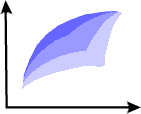Efficient Frontier

William J. Bernstein
Efficient Frontier

William J. Bernstein
![]()
The Dark Side of the Moon
As someone who is too lazy to remove old pieces from the site, I avoid topical commentary—with enough water under the bridge, one’s opinions are almost certain to be proven wrong, or at least dated. But the investment landscape of the past few weeks has become so bizarre that it needs to be recorded for posterity.
First and foremost, the real yields for Treasuries, at least at the short end, have become negative; it seems highly unlikely that inflation over the next two years, any way you calculate it, is going to be less than the 1.99% yield of the two-year note. (Historical comment: During the Great Depression, because of a quirk in the math, T-bills briefly produced a tiny negative return. However, this occurred during a time of general deflation and thus still resulted in positive real returns.)
This is confirmed by the latest TIPS curve. Notice the negative real yield below five years:

Meanwhile, the junk-Treasury spread, depending on how you measure it, is now north of 700 basis points. If we assume that mid-rated junk has a loss rate of 4% per year and a maturity of 10 years, then its expected real return is the +1% TIPS yield at that point on the curve plus the 7% spread minus the 4% loss rate, or 4%. Compounding things even further, because of forced sales by hedge funds, the yields on municipal bonds are now several dozen basis points above that of Treasuries, something that occurs perhaps once in a generation, and usually at times of local government distress, which does not seem in the cards at the moment.
To complete the picture, stocks, if we are lucky, are still priced for a long-term real return of about 3.5 percent. (The dividend yield of the S&P 500 is currently 2.37%, to which another optimistic percent of real per-share growth can be added.)
Conclusion: The debt markets are so out of whack that we are now at a point where credit risk is being rewarded more than equity risk, something that should never happen in a world where equity investors own only the residual rights to earnings. This cannot last for very long: either spreads will tighten rapidly, equity prices will fall rapidly, or both. (Or, chortle, earnings will grow more rapidly.) Stay tuned.
Copyright © 2008, William J. Bernstein. All rights reserved.
The right to download, store and/or output any material
on this Web site is granted for viewing use only. Material may not
be reproduced in any form without the express written permission of William
J. Bernstein. Reproduction or editing by any means, mechanical or electronic,
in whole or in part, without the express written permission of William J.
Bernstein is strictly prohibited. Please read the disclaimer.